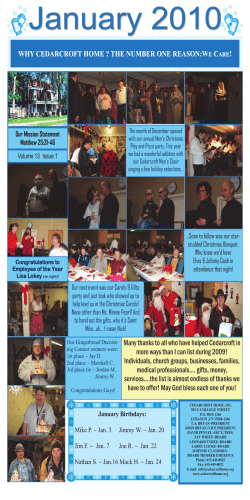
Statement by Dr. Nawaf Salam at the Security Council on the
Statement by H.E. Dr. Nawaf Salam Permanent Representative of Lebanon to the United Nations at the Security Council The Humanitarian Situation in Syria New York, April 24, 2015 ،السيدة الرئيسة اسمحي لي أوالً أن أتوجه بأصدق،ل ّما كانت هذه الجلسة مخصصة للتداعيات اإلنسانية لألزمة السورية الذين قضوا في البحر المتوسط خالل األسبوع الماضي، ال سيما السوريين،التعازي إلى أهالي كل الضحايا . وبحثا ً على األمن والحياة الكريمة ألطفالهم، هربا ً من اليأس،هربا ً من العنف Mrs. President, We, like Ms. Angelina Jolie Pitt, wish that the refugees she spoke to in the region could be with us to tell their stories. But let me thank all our briefers today for having spoken so genuinely and convincingly on their behalf. Let us hope that the resonance of their messages in this room will be expeditiously acted upon. Past February, as we approached the fourth anniversary of the eruption of the crisis in Syria, I addressed this Council and expressed our disappointment at its continuing failure to facilitate the realization of a political solution that would put an end to the tragic cycle of violence that has engulfed the country for 4 consecutive years, leaving more than 250,000 people dead and many more wounded, leading to the destruction of many of the most ancient urban centers in the history of mankind, and scarring the fabric of its society for generations to come. Two months later, we are back in the same chamber discussing the same issue, without any realistic prospects to ending the crisis, which seems to be escalating rather than demising, spreading to new areas inside the country and affecting the lives of more civilians, including Palestinian refugees in Yarmouk. Moreover, the crisis in Syria is contributing directly or indirectly to the increasing sectarian and extremist rhetoric and violence in the region, adding an unwelcome complication to the multiple political and socio-economic problems fueling many of the other crises. The humanitarian impact of the crisis continues to grow. Today, more than 7.6 million Syrians are internally displaced; 3.9 million are refugees in neighboring countries. Lebanon, the smallest country in the region, is alone hosting more than 1.2 million registered Syrian refugees, not to mention the unregistered, and 45,000 Palestinian refugees from Syria representing about a third of my country’s total population. To illustrate the magnitude of this unprecedented demographic impact, I’ll quote a tweet posted a few days ago by Ambassador Angelina Eichhorst, the Head of the European Union Delegation to Lebanon “In 2013-2014 the EU admitted 116,263 refugees from Syria. UNHCR Lebanon registered more than 1 million, tenfold the number for a country 400 times smaller”. Mrs. President In Lebanon, the Crisis has had a devastating impact on the security, development, economic activity, social progress and the environment, overstretching the capacity of our social services, healthcare and education systems, housing, water and sanitation facilities and the energy infrastructure. Poverty has increased by 61%, unemployment has doubled and the average personal income of the local population has significantly decreased. In this regard, I once again call on the donor community to meet Lebanon’s humanitarian and development needs that have been clearly identified in the Lebanon Crisis Response Plan 2015-2016, which was crafted by my Government in coordination with the relevant UN agencies and other partners and adopted in December 2014. While we welcome Kuwait’s leadership in hosting a third international pledging conference for Syrian refugees last month, and the generosity shown by the donor community, we note that out of the 8.4 billion dollars identified by the relevant UN agencies to implement the regional and national response plans, only 3.6 billion dollars were pledged. And, as you know, not all pledged money is always actually dispensed. Unfortunately Mrs. President It is our belief that tackling humanitarian crises through the narrow channel of humanitarian assistance has proven to be insufficient; hence, the need to tap on the wider purse of development funds, and our call on donors, international financial institutions and UN agencies to provide neighboring countries, including middle income countries like Lebanon and Jordan, with adequate development assistance that would meet their needs, strengthen their resilience and alleviate the impact of the crisis. Mrs. President, Before concluding, I would like to quote from a recent op-ed by Baroness Amos in the Washington Post: “Countries look to the United Nations to exercise moral authority. Time after time, they are disappointed. They want an international system that is just, promotes equality, champions the vulnerable and oppressed, protects human rights and holds its members to account. In the modern world, with the complexity of the challenges facing us, this is becoming harder and harder. But it is possible. It is a challenge, but one that, with determination and commitment, we can overcome”. Finally, the call on this Council to visit the region was powerfully articulated and reiterated today. Jordan, Mrs. President, was a pioneer long ago in calling for such a visit. Lebanon and Turkey supported your call then. We hope that after our deliberations today, and in the remaining days of your presidency, you will succeed in convincing your colleagues of the need and timeliness of such a visit in the hope that, in addition to their political interest, they will see with their heart and listen with their humanity. Thank you.
© Copyright 2026











